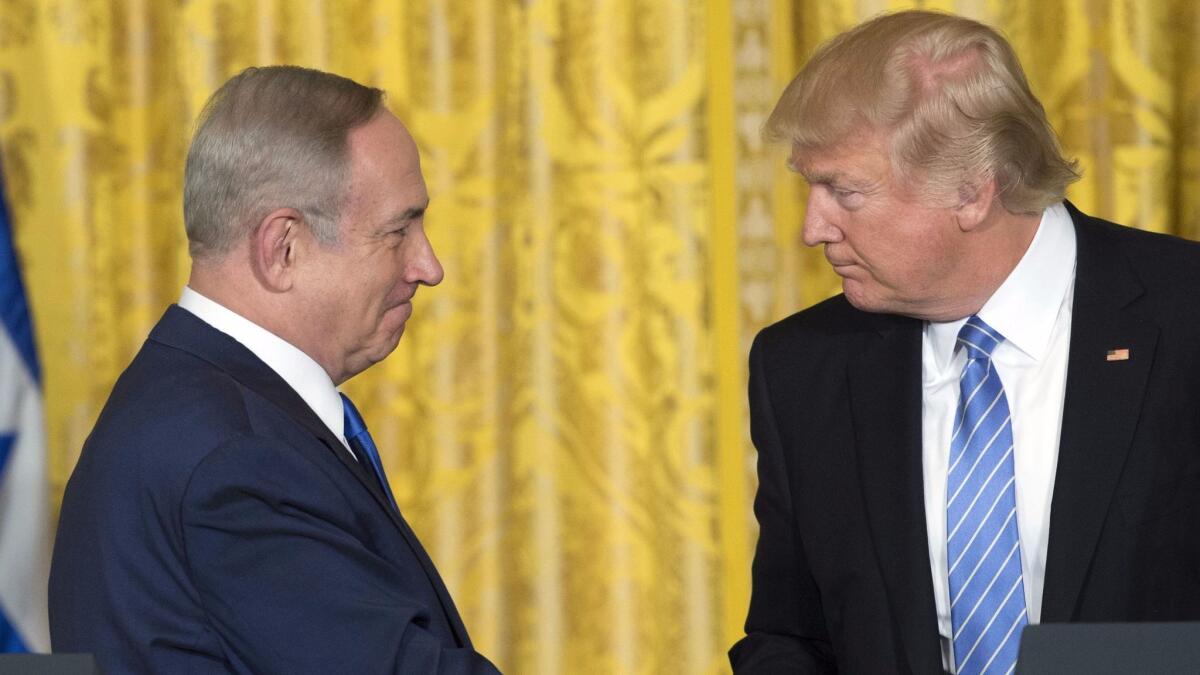Many in Israel cheer U.S. attack on Syria as a welcome sign of a more assertive key ally

- Share via
Reporting from Tel Aviv — Many Israeli political leaders and security experts hailed the U.S. missile strike on Syria as a sign of more forceful American involvement in the Middle East.
The attack Friday was portrayed in some cases as a decisive statement by Israel’s all-important ally, showing a willingness to reassert itself against Syria, Iran and the Lebanese Shiite militant organization Hezbollah, an alliance viewed by Israel as its biggest strategic threat.
Russia’s ability to shift the tide of the Syria civil war in the last year and a half had stoked concern in Israel that both Iran and Hezbollah will get a freer hand to set up a forward base in Syria to attack Israel.
The U.S. strike came in response to a chemical weapons attack by Syrian President Bashar Assad’s forces Tuesday in the rebel-held province of Idlib that killed more than 70 people and injured hundreds.
“President Trump sent a strong and clear message today that the use of and spread of chemical weapons will not be tolerated,’’ said Prime Minister Benjamin Netanyahu in a statement Friday. Israel “hopes that this message of resolve in the face of the Assad regime’s horrific actions will resonate not only in Damascus, but in Tehran, Pyongyang and elsewhere.’’
The Obama administration decision not to use direct military force to punish the Assad government for the use of chemical weapons in 2013 after warning that it would be a “red line” for action had been seen in Israel as a worrying sign of indecisiveness.
Trump’s decision to act following chemical attacks was seen as an important signal by the U.S. of willingness to enforce those red lines abroad.
Israeli President Reuven Rivlin praised what he called Trump’s “clear and determined” steps.
“In acting as it has, the United States serves as an example to the entire free world, which must support any step required to bring the atrocities in Syria to an end,” Rivlin said.
The attack won support from leaders of the Israeli parliamentary opposition as well.
“The attack was important, necessary and correct,” Tzipi Livni, a former Israeli foreign minister and a parliament member in the Zionist Union party, said in a television interview.
During the Obama administration, Israeli leaders became anxious by what they saw as the gradual pullback of the U.S. from the Middle East. Israelis complained that the shift created a vacuum of power in Syria and in the broader region that was filled by Assad allies such as Iran and Russia.
They also complained that the U.S. had lost focus on Iran’s growing influence on the region because it had formed a tacit alliance with Tehran to fight Islamic State.
“We have been through several years in which the previous U.S. administration decided to disengage from the Middle East and stop playing the role of the international cop,” said former Defense Minister Moshe Yaalon in an interview with Israel Radio. “I hope that what we saw overnight is the beginning of a change in direction — in the understanding of who is the good and bad in the Middle East.”
Russia’s intervention in the Syrian civil war on the side of Assad and his ally Iran has been another cause for caution.
When Israel came out this week and accused the Syrian government of responsibility for the chemical attacks and called on the U.S. to intervene, it drew a rare protest from the Russian government in the hours before the U.S. attack.
Officials in Syria, Russia and Iran and condemned the U.S. strike.
Images of people killed or injured in the Tuesday attack in Syria prompted soul-searching in Israel about whether the country has a responsibility to intervene — and perhaps change its policy of watching the civil war from the sidelines — when chemical weapons are being used next door.
NEWSLETTER: Get the day’s top headlines from Times Editor Davan Maharaj »
Israel has intervened in Syria to stop weapons transfers to Hezbollah, to deter cross-border attacks in the Golan Heights, and to give humanitarian assistance to Syrians from rebel villages near the border. Security officials have sought to avoid becoming mired in the conflict.
Though the U.S. strike raised questions of whether it might trigger retaliatory attacks from Syria on Israel, Israeli security experts said the intervention would in fact help Israel’s ability to deter strikes from Assad or his allies.
“A proactive U.S. like we witnessed this morning strengthens Israel’s deterrence,’’ said Amos Yadlin, a former chief of Israel’s military intelligence branch, on Twitter. “This is an important message to Iran, Assad and Hezbollah.’’
Mitnick is a special correspondent.
ALSO
Syrian villagers near U.S. missile strike know the sound of battle — but never as horrific as this
President Trump sees pushback from far-right supporters over U.S. airstrike in Syria
U.S. missile strike in Syria dashes hope of improving ties with Russia
More to Read
Sign up for Essential California
The most important California stories and recommendations in your inbox every morning.
You may occasionally receive promotional content from the Los Angeles Times.










